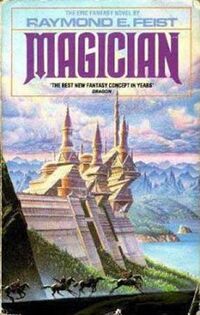For a bookworm, is there any anticipation more delicious than turning the first page of a book that you know you love, but whose plot has largely faded from your memory?
Last night I began again the novel Magician by Raymond E. Feist, having just finished the Daughter of the Empire trilogy he wrote with Janny Wurts―a trilogy set wholly in one of the two worlds of Magician, and partially overlapping the timeline of that story. A quote from a review of Magician by Dragon Magazine should give you a feel for how the book was received, way back in the early 80s:
"[Magician] is filled with new concepts and reworkings of familiar ones that comes off well enough to be embraced as new… more than a breath of fresh air ― it is a sweeping sweet wind which has a chance of putting its author firmly on the throne next to Tolkien ― and keeping him there."
The reason I'm reading Magician is because I have at long last decided to dust off a fantasy novel that I began twelve years ago, with the ridiculously long working title Em, and somewhat more substantial new title Armour of a Fallen God. I reached 100K words and reluctantly put it aside. It was my first attempt at a novel-length work, and in the course of writing it, I broke the first three pieces of advice given to the new writer:
- Start small
- Write from experience (I knew little about European forests and medieval mores)
- Don't edit at the same time
I had reached 100K words and plot-wise was just getting going. But I desperately wanted some closure. I wanted to write and finish something. At that time I happened to read a collection of novellas by Stephen King (the collection is Different Seasons―which, incredibly, even for an established author like King, was viewed as a risk by his publishers), and was reminded of the possibilities of short formats. So I put the fantasy novel aside, and wrote short stories… and thereby broke the fourth piece of advice given to the new writer:
- Whatever you do, don't start another project at the same time
From that time I stopped reading the fantasy genre, despite the fact that it had first fired my reading urge―The Hobbit, LOTR, Magician and the other books of the Riftwar Saga, The Belgariad, The Dragonlance Chronicles… I stopped cold turkey, because I knew that if I read the genre, I would want to write it.
I've been trying to crystallise what it is about the fantasy genre that is so morish. What is the essence of fantasy? Well, I don't know about essence, but part of its appeal for me is how the story being told lives and breathes in an atmosphere of many other, untold stories. This struck me last night as I opened the pages of Magician and read of the young protagonist, Pug, who is caught in a ferocious storm but fears seeking shelter in the dark forest glades because of "remembered tales of outlaws and other, less human, malefactors…" The half-heard myths and histories of LOTR are surely a large part of its appeal.
The fantasy writing of Lewis and Tolkien was scorned as escapist literature, but they regarded fantasy as a different way of talking about real life, in a guise that, because fantastic, sneaks under our defences. G.K. Chesterton sums this up nicely: "Fairy tales do not tell children the dragons exist. Children already know that dragons exist. Fairy tales tell children the dragons can be killed."
Well, given the lines from the Dragon Magazine review (written in the 80s, note), it seems a difficult prospect to write a fantasy novel that is new enough to avoid being cliched, but familiar enough to provide that delicious sense of recognition. Here goes…
